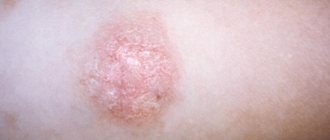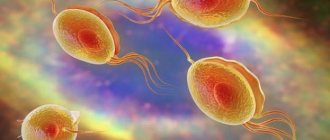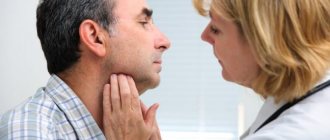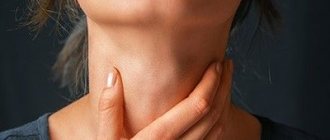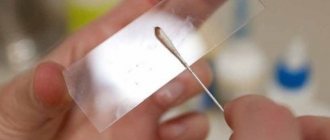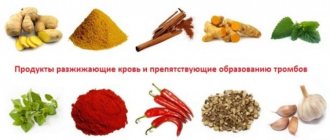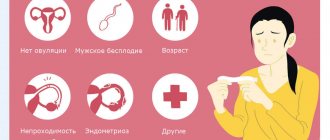Diet for hypothyroidism
The content of the article
Diet for hypothyroidism plays a very important role in therapeutic management. Hypothyroidism is a syndrome of symptoms that occurs as a result of a deficiency of thyroid hormones in the body. In order for the thyroid gland to produce and secrete hormones in the required quantities, it needs iodine.
This element is the main component of both thyroxine and triiodothyronine (thyroid hormones). If the cause of hypothyroidism is iodine deficiency, a diet rich in iodine is key to treatment. However, when treating hypothyroidism due to other causes, including thyroid dysfunction or inflammation, pharmacotherapy is necessary, but diet may increase its effectiveness.
Diet rich in iodine
Signs of hyperthyroidism:
- Sudden weight loss;
- Mood swings;
- Insomnia;
- Nervousness;
- Protrusion of the eyeballs;
- Arrhythmia.
What's wrong with the thyroid gland? How to recognize and prevent illness in a child in time Read more
What diet to use for hypothyroidism?
A diet for hypothyroidism should, first of all, be rich in iodine, which is necessary for the proper functioning of the thyroid gland.
About 70% of the iodine in the human body accumulates in the thyroid gland and allows it to produce and secrete thyroxine and triiodothyronine. For the normal functioning of the adult thyroid gland, it needs 150 mcg of iodine per day. In pregnant and lactating women, the need for iodine increases to 250 mcg/day.
Insufficient intake of this element will lead to a decrease in the production of thyroid hormones and, consequently, to an increase in the production of thyrotropin, a hormone secreted by the pituitary gland, which stimulates the secretory functions of the thyroid gland. Hypothyroidism can develop as a result of iodine deficiency, but it is worth remembering that the disease can also be caused by disorders in the thyroid gland itself or in the hypothalamic-pituitary system, which regulates the functioning of the thyroid gland.
Hypothalamic-pituitary system
A diet for hypothyroidism, in addition to iodine, should also contain a sufficient amount of selenium, which affects the absorption of iodine. Selenium deficiency can also lead to decreased concentrations of triiodothyronine (T3) in the blood.
Diet for thyroid diseases
The New Year is upon us and despite the challenges we have faced over the past few months, there seems to be light at the end of the tunnel. Now more than ever, people are looking for ways to improve their health, and people with thyroid disease are no exception.
Patients often ask about the “thyroid diet”: dietary changes they can make, supplements they can take, or toxins they can avoid to treat or reverse their thyroid disease.
How can I improve hypothyroidism symptoms beyond traditional medical therapy?
How can I lower serum thyroid autoantibody titers?
How much of this food or supplement is too much for my thyroid?
In truth, there is a lot of information that may seem convincing. However, the evidence used as the basis for clinical recommendations is generally of low quality and therefore less than ideal. Here we will discuss the most popular nutrition topics related to thyroid disease.
Iodine
The production of thyroid hormones requires adequate levels of circulating iodine, obtained from food or supplementation. A lack of iodine puts a person at risk of developing or worsening hypothyroidism. The Institute of Medicine of the National Academies recommends that adults take 150 mcg of iodine per day, while higher doses are recommended for pregnant and breastfeeding women (220 mcg/day and 290 mcg/day, respectively).
Common dietary sources of iodine include iodized salt, seafood (including seaweed and fish), and some breads and grains. It is important to note that sea salt, despite its name, does not naturally contain iodine.
The US does not require iodine to be listed on food packaging, so dietary sources can be difficult to identify. And while iodine levels can be measured in a person's urine or blood, it is not particularly informative because the levels only reflect iodine levels over the past few days. Fortunately, most of the United States has sufficient iodine.
Some people with dietary restrictions may be at risk of low iodine levels. Recommendations for adding iodine to food at a dose of 150 mcg/day are especially relevant for women planning pregnancy; already pregnant women or women in the postpartum period and breastfeeding, when the need for iodine is greater.
Tablets labeled "Iodine for Thyroid Health" are usually available over the counter and can contain several hundred times the recommended daily amount of iodine in just one dose.
Other products labeled "thyroid support" contain spirulina or algae, which naturally contain iodine, but in varying amounts that could potentially be excessive.
Taking too much iodine can cause the thyroid gland to shut down as a result of excess iodine (iodine-induced hypothyroidism) or to produce excess thyroid hormones (iodine-induced hyperthyroidism).
There is also evidence that chronic excess iodine may cause autoimmune thyroiditis because iodinated thyroglobulin is immunogenic. For these reasons, the American Endocrine Association recommends avoiding supplements containing >500 mcg of iodine per day.
Goitrogens
The term "goitrogen" refers to any substance that can cause a goiter or enlargement of the thyroid gland. Goitrogenic substances include substances that reduce the amount of available iodine in the thyroid gland and substances that inhibit any other component of normal thyroid hormone production. The most common examples of goitrogens in the diet are cruciferous vegetables and soy products.
Cruciferous vegetables
Cruciferous vegetables belong to the Brassica genus and include broccoli, cabbage, Brussels sprouts, cabbage, turnips, cauliflower, collard greens, and bok choy. They are rich in glucosinolates and other substances that interfere with various stages of thyroid hormone synthesis. Eating healthy amounts of cruciferous vegetables certainly has its benefits, but eating too much or eating them all the time can lead to or worsen hypothyroidism.
So how much is too much? There is very limited data on the amount of cruciferous vegetables consumed to negatively impact thyroid function.
In a study of “euthyroid” volunteers who took commercial cabbage juice twice daily for 7 days, mean 6-hour thyroid radioiodine intake decreased by 2.52% from baseline values, but serum thyroid function tests the glands have not changed.
The report describes a case of extreme myxedema (coma) in an 88-year-old Chinese woman who consumed 1.0-1.5 kg of raw bok choy daily for several months in an attempt to improve control of her diabetes.
However, a recent randomized clinical trial of “euthyroid” participants who took a broccoli sprout drink for 12 weeks showed no changes in their serum thyroid function tests, thyroglobulin levels, or autoimmune thyroid status compared with those in the placebo group.
So how can you answer patients' questions about whether cruciferous vegetables should be avoided? We tell patients with euthyroidism and hypothyroidism that although earlier evidence suggests that frequent consumption of large amounts of cruciferous vegetables may reduce thyroid hormone production, more recent clinical studies confirm that there is absolutely no need to completely avoid these healthy foods.
Common sense is important in this topic. We recommend a well-balanced diet that includes reasonable amounts of cruciferous vegetables. The problem is that there is little evidence about what is "smart" when it comes to cruciferous vegetable consumption and thyroid health.
Soybeans
Dietary soy products, including soy milk, tofu, soy sauce, tempeh and miso, contain isoflavones, polyphenolic compounds that are also classified as phytoestrogens due to their estrogen-like effects. Because isoflavones can inhibit the action of thyroid peroxidase, which is essential for the synthesis of thyroid hormones, it has been suggested that dietary soy consumption may increase the risk of hypothyroidism. Similarly, patients being treated for hypothyroidism who consume large amounts of soy may require a higher dose of thyroid hormone replacement therapy.
But what does the bulk of the scientific evidence show? In euthyroid individuals living in iodine-rich areas, consumption of normal amounts of soy appears to have very little adverse effect on serum thyroid function. High soy intake among both euthyroid and subclinical hypothyroid people was associated with only a modest increase in serum thyroid-stimulating hormone (TSH) levels; there were no changes in free thyroid hormone levels.
The exception is soy-based infant formula, which is used to feed newborns with congenital hypothyroidism. An increase in the dose of levothyroxine may be necessary to adequately meet their thyroid hormone needs.
We generally advise our adult patients that normal amounts of soy are generally safe. There is no reason to avoid soy altogether if a patient with hypothyroidism is being treated with thyroid hormone replacement medications.
Trace minerals
Selenium
Selenium is a micronutrient important for thyroid hormone metabolism. In the United States, the recommended daily intake of selenium for men and non-pregnant, non-lactating women is 55 mcg.
The richest dietary sources of selenium are seafood and organ meats. Typical sources in the US diet are bread, grains, meat, poultry, fish and eggs.
The upper tolerable intake level for selenium is 400 mcg/day. Although selenium toxicity is not commonly encountered in clinical practice, symptoms of excessive intake include nausea; discoloration, brittleness and loss of nails; hair loss; fatigue; irritability; and bad breath (often described as “garlic breath”).
Most of the data on selenium and thyroid disease relate to chronic autoimmune thyroiditis. Some studies have shown that selenium supplementation for autoimmune thyroid disease may be beneficial, as low levels are associated with an increased risk of developing goiters and thyroid nodules.
However, although selenium supplementation may reduce serum thyroid autoantibody titers in the short term, it remains unclear whether this reduction in antibody levels correlates with long-term maintenance of normal thyroid function or with a reduction in adverse obstetric outcomes in pregnant women with positive serum thyroid antibodies.
We generally do not recommend that our patients take selenium supplements for the sole purpose of improving thyroid dysfunction or autoimmunity.
However, one exception is in patients with mild Graves' ophthalmopathy. In this group of patients, selenium supplementation may improve quality of life and the course of eye diseases. The European Thyroid Association/European Graves' Orbitopathy Group recommends selenium in these patients at a dose of 200 mg per day for 6 months.
Zinc, copper and magnesium
Unfortunately, the roles of zinc, copper, and magnesium in the synthesis and metabolism of thyroid hormones are less well defined. Their serum levels are inconsistently related to the levels of free or total thyroid hormones. But a meta-analysis showed an association between selenium, copper and magnesium levels with the risk of thyroid cancer. Based on the available evidence, we recommend that supplementation with these micronutrients be prescribed solely for the purpose of improving thyroid function.
Fluoride
Fluoride is found in the environment or in drinking water artificially enriched with it (additive to prevent dental caries). It is also present in foods such as tea, processed foods, dental products, dietary supplements, and foods treated with fluoride pesticides.
Animal studies dating back to the 1970s described a decrease in serum thyroid hormone levels due to fluoride exposure, although a clear mechanism has not been established.
In humans, studies of the relationship between fluoride exposure and hypothyroidism have shown conflicting results. A recent population-based study described a modest increase in serum TSH levels in iodine-deficient adults with higher urinary fluoride levels.
In the absence of rigorous clinical studies, it remains unclear whether these results are clinically significant? Based on available observational data, it is difficult to determine what degree of fluoride exposure may adversely affect thyroid health.
Other Dietary Recommendations
Popular interventions in the functional medicine community include gluten-free diets; sugar-free diets; and probiotics to improve thyroid health and treat leaky gut syndrome, a theory that increased intestinal permeability leads to the development of various diseases. Do we have data to support these recommendations?
Gluten-free diet
Good evidence supports a link between celiac disease (gluten intolerance) and autoimmune thyroid disease. This is expected given the known increased risk of developing another autoimmune disorder when a person has already been diagnosed with the first.
A meta-analysis of nearly 95,000 patients found a threefold increase in thyroid disease (specifically Hashimoto's thyroiditis) among patients with celiac disease compared with control participants who did not have it.
Thus, some scientists have suggested that testing patients with autoimmune thyroid disease for celiac disease and vice versa is a reasonable consideration, especially when presenting with symptoms suggestive of another disease.
Of course, this leads us to ask questions:
What is the effect of a gluten-free diet on thyroid autoimmunity, risk factors for thyroid dysfunction?
Can avoiding gluten reduce the risk of developing Hashimoto's thyroiditis in people with celiac disease?
There are some limited studies on this topic.
One small study in participants with Hashimoto's thyroiditis who followed a gluten-free diet for 6 months showed a decrease in serum thyroid antibody titers, but no changes in serum TSH or thyroid hormone levels.
In contrast, another study of patients with celiac disease showed no effect of a gluten-free diet on serum thyroid function tests, serum thyroid antibodies, or thyroid ultrasound findings after 1 year of dieting.
It is difficult to counsel patients based on these small observational studies with conflicting results.
There are currently no data on whether a gluten-free diet in the absence of celiac disease plays a role in the health of patients with or without established thyroid disease.
Different power mode
Unfortunately, there is no definitive data on whether leaky gut syndrome, a sugar-free diet, or the use of probiotics affects the thyroid gland.
By examining differences in food consumption patterns between patients with and without Hashimoto's thyroiditis, scientists found that patients with Hashimoto's thyroiditis tended to eat more animal fats and processed meats, while patients without thyroiditis tended to eat more red meat. , whole grains and vegetable oils. The clinical significance of self-reported dietary trends among these groups remains unclear. Further research is needed to determine whether there is a link between this dietary pattern and thyroid autoimmunity.
Coffee, tea, and alcohol do not appear to affect the risk of thyroid cancer, although coffee reduces the absorption of oral levothyroxine in people being treated for hypothyroidism.
The potential benefits of vitamin D as a preventive or therapeutic agent for the treatment of various thyroid diseases remain unclear.
Conclusion
So what do we have left? We need to have candid conversations with our patients, recognizing that the relationship between thyroid disease, diet, and supplements is complex. Of course, much remains to be understood through ongoing research.
In the meantime, the following recommendations are safe and supported by reliable data:
-150 mcg of iodine per day for those with dietary restrictions or those planning a pregnancy, currently pregnant or breastfeeding;
-do not avoid cruciferous vegetables or soy for adults when consumed in reasonable quantities;
-and consult your doctor about thyroid disease that may benefit from selenium.
It is appropriate to advise patients that other widely advertised thyroid treatments have less evidence, with very limited and conflicting data.
Angela M. Leung, MD, MS, is an endocrinologist at UCLA Health and the VA Greater Los Angeles Healthcare System, and an assistant professor of endocrinology, diabetes and metabolism at the David Geffen School of Medicine at UCLA.
She speaks on the topics of iodine nutrition, environmental thyroid toxicants, thyroid nodules, and thyroid cancer and is an advisory board member for Medscape Endocrinology.
Gonzalo J. Acosta, MD, is a fellow in endocrinology at UCLA Health and the VA Greater Los Angeles Healthcare System.
Original source:
https://www.medscape.com/viewarticle/943151?src=mkm_210117_mscpmrk_Endo_Thyroid_%20ATA&uac=144068HR&impID=2980704&faf=1
Translated by general practitioner: Ekimov I.V.
What to eat for hypothyroidism?
So what should you eat if you have hypothyroidism? Fish is an excellent source of iodine in the diet. Most of this element contains cod (100 mcg of iodine per 100 g), salmon (50 mcg / 100 g) and mackerel (45 mcg / 100 g). Iodine is also present in mineral water, but not in all its types, so you should keep an eye on the label when looking for this element.
Table salt is also a source of iodine, as many countries have passed legislation requiring salt manufacturers to iodize table salt. Selenium, in turn, is found in grain products, meat, fish, dairy products, eggs and vegetable sprouts.
Iodized table salt
In general, the diet for hypothyroidism should be properly balanced. Healthy protein should make up 15% of your daily energy needs, complex carbohydrates 55%, fats 30% (with 20% unsaturated fatty acids and saturated fats maximum 10%).
Dietary fiber should be an important part of the diet because constipation is very common in patients suffering from hypothyroidism. It is recommended to consume 25-40 grams of dietary fiber per day.
Authorized Products
Proper nutrition for high cholesterol should become the norm. What should it be? First of all, you need to exclude meat broths - prepare vegetarian soups; if this is difficult and unusual for you, then you can use weak secondary broth for first courses and carefully skim off the fat. Use potatoes in minimal quantities and it is better to prepare combined vegetable soups, cabbage soup and borscht.
Cabbage for high cholesterol Meat and poultry should be taken of lean types, poultry skin is unacceptable, additional fat should be trimmed from meat. Since the diet involves limiting fat, the meat should be boiled or baked without adding sour cream, mayonnaise or any fat. Use vegetables as a side dish, not cereal. It is better to cook them for breakfast (oatmeal, buckwheat and brown rice).
Cabbage (all types), carrots, zucchini, pumpkin, eggplant, or salads made from fresh vegetables and green peas will help lower cholesterol levels. The total amount of vegetables eaten per day is at least 400g.
Use virgin vegetable oils to season ready-made dishes. Flaxseed oil, a leader in the content of omega-3 fatty acids, which regulate the production of beneficial lipids, is useful in this regard.
Lowering cholesterol levels can be achieved by introducing low-fat sea fish into the diet, but the consumption of meat (chicken) should still be limited to once a week. When it comes to fish, you should choose dietary varieties: hake, haddock, blue whiting, navaga, pollock, pollock.
Bread made from rye, grain flour and bran is allowed. You can use yeast-free bread (with bran, with flax seeds) for snacks and first courses. Milk and fermented milk products are allowed only in low fat content and in limited quantities. Green tea and weak coffee with milk and without sugar, vegetable and fruit juices without sugar are allowed.
What should you not eat if you have hypothyroidism?
What should you not eat if you have hypothyroidism? Endocrinologists recommend limiting the consumption of foods containing sulfurocyanins and goitrogens. These substances inhibit the absorption of iodine and contribute to the development of goiter, that is, hypertrophy of the thyroid gland. Foods that cause goiter include:
- vegetables from the cabbage family - mainly cabbage, cauliflower, broccoli, turnips, rutabaga;
- legumes (soybeans);
- peanut;
- mustard;
- milk from silage-fed cows.
Symptoms of hypothyroidism
It can be difficult to identify hypothyroidism based on patient complaints. Patients with hypothyroidism complain of weakness, drowsiness, fatigue, memory loss, and depressed mood. Many people are concerned about dry skin, brittle nails, active hair loss, swelling of the face and limbs, moderate weight gain due to developing edema, and the appearance of chilliness. In severe cases, lethargy, slow speech, a characteristic hoarse voice, swelling of the tongue, slow pulse, and constipation may appear. With hypothyroidism, women may develop infertility. Men with hypothyroidism may be concerned about decreased potency.
The quick identification of hypothyroidism is hampered by the fact that such complaints often occur in completely healthy people. Indeed, who among us does not sometimes complain of weakness and drowsiness, decreased performance? In spring and winter, this condition is almost the norm for many. It is important for an endocrinologist to have enough knowledge and experience to distinguish between the symptoms of hypothyroidism and the complaints of completely healthy people who are tired of intense work and a difficult life schedule.
Diet for hypothyroidism caused by Hashimoto's
The diet for hypothyroidism caused by Hashimoto's disease requires some changes. Patients suffering from autoimmune thyroiditis are advised to increase their intake of omega-3 fatty acids due to their anti-inflammatory properties, and to take vitamin D and B12 supplements due to the high risk of pernicious anemia.
Vitamin D supplement
The diet should also be rich in healthy protein, which should account for 25% of daily energy needs.
Patients with Hashimoto's disease are advised to undergo diagnostic tests for celiac disease, as the diseases often coexist. Sometimes doctors recommend that patients go on a gluten-free diet regularly, as this can help alleviate the autoimmune process.
ONLINE REGISTRATION at the DIANA clinic
You can sign up by calling the toll-free phone number 8-800-707-15-60 or filling out the contact form. In this case, we will contact you ourselves.
If you find an error, please select a piece of text and press Ctrl+Enter
Prevalence of hypothyroidism
Hypothyroidism is a very common disease. Scientific evidence suggests that the prevalence of hypothyroidism is higher in northern regions than in southern regions. The average incidence of hypothyroidism is 19 per 1000 women. Among men, hypothyroidism is rare - in 1 case per 1000. With age, hypothyroidism begins to occur even more often - in some regions, hypothyroidism can be detected in 2-3% of women aged 50 years and older.
The number of patients with hypothyroidism is so large that sometimes up to 50% of patients present with hypothyroidism-related complaints when visiting an endocrinologist.
